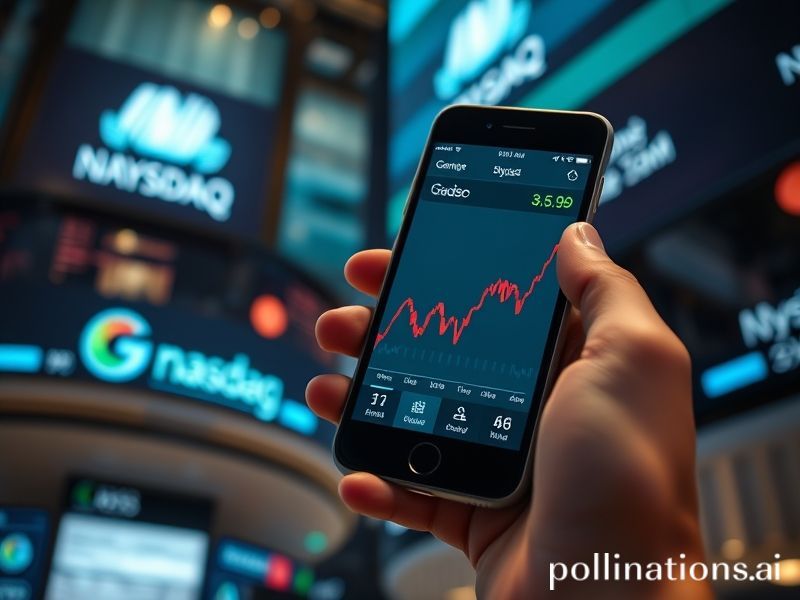Google Stock Hits Record High: The World Rallies Around a Search Bar as National Currency
GOOGLE STOCK: THE WORLD’S FAVORITE DIGITAL LOTTERY TICKET
An international dispatch from the frontlines of capitalism, where a search bar has become sovereign.
Global markets woke up this week to discover that Alphabet—parent to Google, the search engine that taught us to ask questions we never wanted our mothers to hear—had added another 4% to its share price, pushing the company’s market cap past the GDP of Argentina. If the comparison feels unfair, it is: Argentina can still default, but Google’s servers only blink when someone in Mountain View sneezes on a fiber-optic cable.
From Singapore trading floors to São Paulo coffee shops, traders now speak of “GOOGL” the way medieval peasants once invoked the plague—simultaneously dreaded and irresistible. In Tokyo, a junior analyst confessed over vending-machine sake that he’d mortgaged his future on the assumption humanity will never tire of asking, “Why does my elbow hurt?” In Lagos, fintech founders treat every uptick in the stock as proof that data colonialism pays better than the old-fashioned kind. Meanwhile, in Frankfurt, the European Central Bank watches the chart with the same weary affection a zookeeper reserves for the pandas: adorable, unpredictable, and critical to the gift-shop revenue.
The price surge, analysts insist, stems from “AI optimism.” Translation: having scraped the entire internet, Google is now charging rent on the photos of your toddler, the essays of your dead uncle, and the collective insomnia of humankind. Investors applaud this as innovation; everyone else calls it Tuesday.
European regulators, bless their paper-shuffling hearts, threaten fines that amount to roughly six minutes of Alphabet’s quarterly ad revenue. Brussels might as well invoice the Pacific Ocean for tide damage. Across the Channel, Brexit Britain has decided the best response is to invite Google to build more data centers on former greenbelt land. Nothing says “sovereignty” like swapping sheep pastures for server farms that hum the national anthem of shareholder value.
In China, where Google search remains banned, the stock still trends on Weibo—proof that schadenfreude is the one product Beijing never restricts. State media commentators note, with barely concealed glee, that any U.S. company large enough to rival a medium-sized country eventually becomes a diplomatic liability. They should know; they turned their own tech titans into cautionary origami.
South of the equator, Brazil’s central bank governor gamely suggests taxing digital advertising to fund the Amazon, a proposal as likely to pass as a snowstorm in Manaus. Still, the symbolism stings: the lungs of the earth auctioned off to finance banner ads for protein powder.
Back in Washington, antitrust hearings proceed at the speed of continental drift. Senators who still print emails ask earnest questions about “algorithmic fairness,” while aides frantically Google the answers under the desk. The spectacle reassures voters that democracy is safe—provided it loads before the mid-roll ad.
Humanitarian agencies offer darker math. The annual cost to end world hunger clocks in at roughly one-tenth of Alphabet’s yearly revenue, a figure that makes for awkward cocktail chatter in Davos. But let’s be fair: feeding everyone would only create more search queries, so really, Google is just investing in future market share.
Conclusion
So the stock climbs, serene as a weather balloon over an overheating planet. Every uptick is a silent referendum on our collective surrender: to convenience over privacy, to prediction over serendipity, to shareholder value over human values. Somewhere in Mumbai, a teenager waits for a page to load so she can apply for a visa to anywhere else; the same ad server monetizes her desperation and a hedge fund’s jubilation. The market, in its infinite wisdom, calls this efficiency. The rest of us might call it the most expensive free lunch in history. But please, don’t take my word for it—just Google it.







